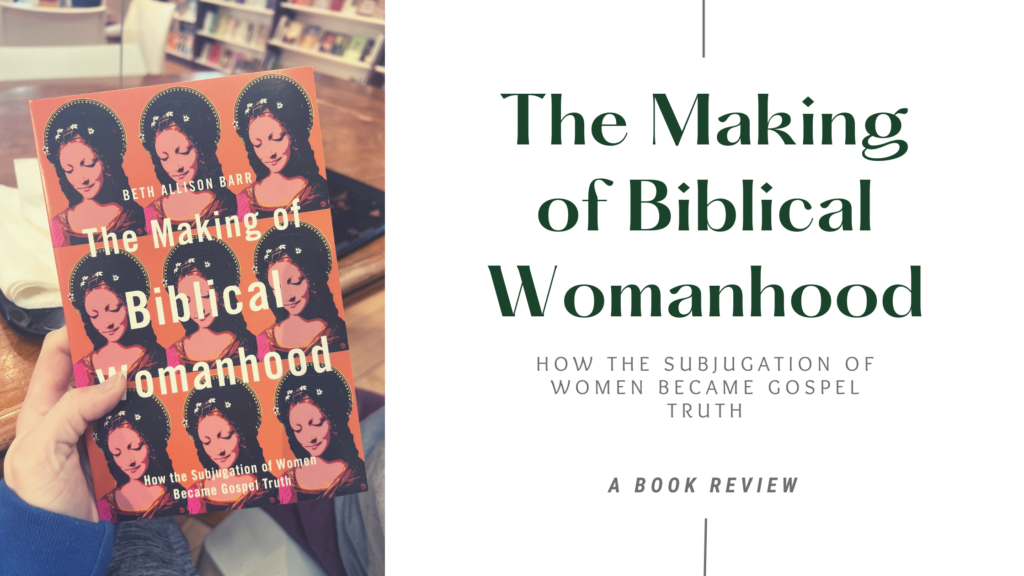I finally got around to reading The Making of Biblical Womanhood: How the Subjugation of Women Became Gospel Truth by Beth Allison Barr. It’s been on my TBR (to be read) pile for a hot minute, and now that I’ve finally gotten around to it I want to share my thoughts on what this book is – and what it isn not.
note: If you didn’t grow up as an evangelical Christian, the book and this review won’t make a ton of sense. This book is geared specifically toward women who grew up in Christian communities that upheld “Biblical Womanhood” as a value.
This post may contain affiliate links, meaning we may earn a commission for any purchases made through our links.
What is The Making of Biblical Womanhood about?
Beth Allison Barr has a PhD in Medieval History and is a history professor at Baylor University. Her book The Making of Biblical Womanhood relies heavily on her knowledge of Medieval Christianity and her arguments are centered around the participation of women in early Christian communities and throughout the middle ages.
Barr’s book specifically unpacks the modern making of complementarianism and biblical womanhood in the evangelical Christian community. For women like myself who grew up in evangelical communities that uphold these values, the book is portrayed as an enlightening and empowering read as we deconstruct the lessons that taught us to value ourselves as lesser than our male peers.
I was super excited to read it! I was raised in a Baptist church and went to a Lutheran elementary school, so I learned all about biblical womanhood and the unequal expectations for women and girls within evangelical churches. I’m all for any book that wants to unpack that nonsense!
But I must admit… I didn’t enjoy the book as much as I thought I would. I didn’t dislike it, I just didn’t like it as much as I thought I would. Maybe I hyped it up too much in my mind? I don’t know.
I’ll tell you what I did like first, as I think it provides context for exactly what I did not like.
What I did like
First and foremost, I really enjoyed Barr’s expertise and perspectives as a Medieval historian. I have but a lowly undergraduate degree in History and my emphasis was on Modern American History. I can totally admit I’m not particularly well-read on Medieval History. I am definitely glad to have gained some background knowledge from reading this book. The connections she draws between the Medieval era and the culture of the 19th century certainly shed considerable light on how the heck evangelical Christianity has become what it is today.
Her conversational and narrative tone make the history of the early church and women’s participation in it readable to just about anyone, regardless of their interest in history. Barr’s foundational argument is that women were participants in the early Christian community and that it was exciting and different. The enthusiasm she has for this history spills into her writing about her own life, and it really makes for a fun read.
Additionally, I love love LOVED reading about her perspective as someone who left the complementarity community later in life. I peaced out of conservative Christianity in my teens, and all but left Christianity entirely by my mid-twenties. Remembering that there are folks out there who may have taken a longer or simply different deconstruction journey than ourselves is so important.
This, however, leads me to what I didn’t particularly love about the book.
What I didn’t like
I really did enjoy Barr’s book (for the most part) all the way up until the end. I have absolute respect for those who maintain their faith in some ways after deconstructing complementarian Christianity, so it didn’t bother me at all that Barr’s life perspectives are clearly still more conservative than my own. I have very little issue with conservative folks when they’re not trying to legislate their conservatism onto other people, and Barr very clearly stands on the side of protecting human rights over personal philosophies when it comes down to such things.
However, the last chapter or two was when I really started to wonder where she was going to end things – and it was the ending that left me feeling a bit off about the book as a whole.
The Making of Biblical Womanhood spends most of its pages arguing that patriarchy and hierarchy as church values are historically inaccurate and damaging to the modern church. But Barr is still very committed to evangelical Christianity as a whole – which to me seems paradoxical.
Evangelical Christianity is foundationally hierarchical. I simply don’t think that patriarchy can necessarily be removed from it in the way Barr argues it can be.
The basic concept of evangelical Christianity (regardless of any progressive or conservative twist) is that their God is better than yours and they need to tell you all about him because he’s the one true god. That is fundamentally hierarchical. If anyone believes their god is superior to yours, a hierarchy is formed. And as such, allowing women to participate to an equal degree in their evangelical hierarchy isn’t anti-patriarchy or anti-hierarchy. I would argue that is simply a more inclusive version of patriarchy.
She also doesn’t speak a ton to any women other than cis-het women, which left me with a lot of questions about how she sees the roles of LGBTQ women in her church world.
Conclusions
Be that as it may, I still find myself inclined to recommend reading the book. The history she shares is excellent and I really can’t discount the importance of being able to navigate conversations with complementarian Christians through the use of exactly the kind of language that Barr spells out simply and conversationally.
If you’re looking for a book that will help you engage with your conservative mom or grandma, or you’re simply looking for some validation that your defiance of complementarian perspectives was A-OK this book is going to be your friend!
If you’re like me, you may still find yourself twitching at some of her final conclusions and commitment to evangelical Christianity, but maybe that’s not such a bad thing. After all, part of an inclusive and sustainable future is realizing that there are going to be folks that will never see eye-to-eye with. As long as we’re not trying to legislate each other out of existence, there is enough in this world for us all.
It takes all kinds of folk to make the world go ’round, and I commend Barr for having the courage to throw out some of her privileges as a white woman to defy these norms within her community. She is a fine example of someone who has made a commitment to creating change in her space, and follows through on it each day.

